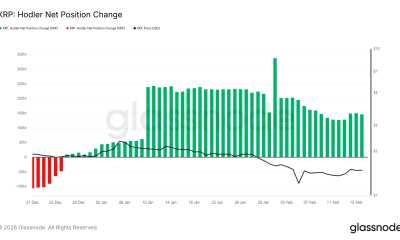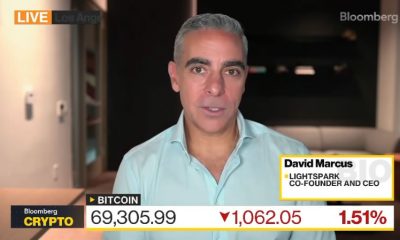Business
Trek to raise $15m, as moves toward extensive drilling program at Christmas Creek

Business
Goldman Sachs to remove DEI board hiring standards amid policy shift

Cornell University law professor William Jacobson discusses rooting racism out of the high education system as well as an op-ed that college students are becoming less woke.
Goldman Sachs plans to remove DEI hiring standards for its board of directors, The Wall Street Journal reported Monday.
The company had removed a requirement for board diversity on companies it was taking public last year, but now plans to remove DEI language in the criteria for its own board members this month. The board’s governing committee evaluates potential candidates based on four criteria, one of which is a more traditional understanding of diversity, encapsulating viewpoints, background, work and military service.
That section also has “other demographics” tagged on to the end, referring to race, gender identity, ethnicity and sexual orientation, according to the Journal. The board now reportedly plans to remove reference to “other demographics.”
The expected change comes after the National Legal and Policy Center, a conservative nonprofit that owns a small stake in the bank, requested the change in September, according to the Journal.

Goldman Sachs is rolling back its DEI hiring standards for its board of directors. (Getty Images / Getty Images)
Goldman Sachs struck a deal with the group under which the board would make the change of its own accord and the NLPC would not submit a formal request circulated to shareholders ahead of the company’s annual shareholder meeting later this year, people familiar with the matter told the outlet.
The change comes as part of a wider rejection of DEI policies thanks in large part to President Donald Trump‘s return to the White House last year.
Trump moved quickly to drop the hammer on DEI, signing an executive order on day one titled “Ending Radical and Wasteful Government DEI Programs and Preferencing,” which directed federal agencies to stamp out DEI-style programs across the federal government. The following day, Trump signed a second order aimed at “restoring merit-based opportunity,” including changes for federal contracting and related compliance.
CORPORATE AMERICA HAS DECIDED THAT DEI NEEDS TO DIE

A view of the Goldman Sachs stall on the floor of the New York Stock Exchange.
“We’ve ended the tyranny of so-called Diversity, Equity and Inclusion policies all across the entire federal government and indeed the private sector and our military. And our country will be woke no longer,” Trump said in March.
The administration has also targeted DEI initiatives at America’s elite universities, seeking new funding agreements with Columbia University, Harvard and others.
Harvard has been a main target of the Trump administration’s attempt to leverage federal funding in order to crack down on antisemitism and “woke” ideology.
In December, lawyers for the Trump administration appealed a judge’s order to restore $2.7 billion in frozen federal research funding to Harvard University.

Harvard banners hang outside Memorial Church on the Harvard University campus in Cambridge, Massachusetts. (Getty Images)
GET FOX BUSINESS ON THE GO BY CLICKING HERE
Harvard sued the administration in April over its attempt to freeze the federal funding and argued in court that the actions amounted to an unconstitutional “pressure campaign” to influence and exert control over elite academic institutions.
Fox News’ Emma Colton contributed to this report.
Business
CNX Resources announces tender offer for 6.000% senior notes due 2029

CNX Resources announces tender offer for 6.000% senior notes due 2029
Business
Octopus Energy Generation to invest $1bn in California clean tech

Octopus Energy Generation is investing nearly $1bn in Californian clean technology projects, deepening its exposure to the US energy transition and accelerating plans to deploy $2bn across the country by 2030.
The funding, channelled through Octopus-managed funds, spans carbon removal, heat battery technology and solar-plus-storage infrastructure, reinforcing the company’s strategy of backing next-generation decarbonisation assets in advanced markets.
Octopus will support two California-based carbon removal companies focused on grassland restoration and reforestation, converting degraded land into high-quality carbon-absorbing assets. Several large technology firms have already agreed to purchase carbon credits from the projects, providing long-term revenue visibility.
The investor will also back heat battery technology developed in the Bay Area, aimed at decarbonising hard-to-electrify industrial processes. The systems are designed to replace fossil-fuel boilers with renewable-powered thermal storage, cutting emissions in sectors that have proven difficult to transition.
As part of the investment drive, Octopus is acquiring a solar and battery storage project in California. The site is expected to be fully operational by July 2026, helping convert the state’s abundant solar resource into dispatchable, low-cost electricity.
The announcement builds on earlier North American investments, including backing floating offshore wind developer Ocergy and solar projects in Ohio and Pennsylvania.
The move comes as Octopus expands its international footprint while maintaining close ties to the UK market. Britain’s clean energy economy grew three times faster than the wider economy in 2024, according to CBI data, and Octopus said overseas investments would ultimately support UK returns and expertise.
Zoisa North-Bond, chief executive of Octopus Energy Generation, said California’s policy environment and technology ecosystem made it an attractive long-term partner.
“Octopus and California are both leading the way in clean energy innovation,” she said. “With supportive policy and world-class entrepreneurship in and around Silicon Valley, it’s an ideal place to back investments that will benefit the UK economy.”
California currently generates more than two-thirds of its electricity from clean sources and aims to reach 100 per cent by 2045, positioning it as one of the world’s most ambitious energy transition markets.
The announcement was made during a visit by the Governor of California to Octopus’s London headquarters, underscoring the growing transatlantic collaboration in clean technology and infrastructure investment.
Business
Stocks to Watch Tuesday: Warner, Danaher, Masimo, Medtronic

Stocks to Watch Tuesday: Warner, Danaher, Masimo, Medtronic
Business
NAPA Owner Genuine Parts Plans to Split Into Two Companies

Genuine Parts GPC -0.30%decrease; red down pointing triangle, the big owner of NAPA auto-care centers, said Tuesday it plans to separate its auto and industrial parts units to create two separate public companies.
The details
The split is the culmination of a review the Atlanta-based company has been undergoing with financial advisers. The Wall Street Journal reported earlier Tuesday that the deal announcement was imminent.
Copyright ©2026 Dow Jones & Company, Inc. All Rights Reserved. 87990cbe856818d5eddac44c7b1cdeb8
Business
Netflix grants WBD 7-day waiver to reopen deal talks with Paramount Skydance


Warner Bros. Discovery on Tuesday said it will reopen deal talks with Paramount Skydance under a 7-day waiver from Netflix to explore “deficiencies” in Paramount’s offer to buy the entirety of WBD.
The legacy media company has a pending transaction with Netflix for its streaming and studio businesses. Paramount launched a hostile tender offer straight to WBD shareholders at $30 per share after losing out to Netflix in a bidding war.
“Netflix has provided WBD a limited waiver under the terms of WBD’s merger agreement with Netflix, permitting WBD to engage in discussions with Paramount Skydance (“PSKY”) (NASDAQ: PSKY) for a seven-day period ending on February 23, 2026 to seek clarity for WBD stockholders and provide PSKY the ability to make its best and final offer,” Warner Bros. Discovery said in a release.
“During this period, WBD will engage with PSKY to discuss the deficiencies that remain unresolved and clarify certain terms of PSKY’s proposed merger agreement,” it said.
Paramount leadership has repeatedly said its $30-per-share, all-cash offer is not its “best and final.” Last week the company sweetened its offer with additional “enhancements,” but stopped short of raising the per-share value.
Warner Bros. Discovery said Tuesday that a senior Paramount representative informed a WBD board member that it would pay $31 per share if deal talks were to reopen.
After the limited waiver period, Netflix will retain its matching rights provided by the merger agreement, WBD said.
“Throughout the entire process, our sole focus has been on maximizing value and certainty for WBD shareholders,” said WBD CEO David Zaslav in a statement. “Every step of the way, we have provided PSKY with clear direction on the deficiencies in their offers and opportunities to address them. We are engaging with PSKY now to determine whether they can deliver an actionable, binding proposal that provides superior value and certainty for WBD shareholders through their best and final offer.”
WBD also on Tuesday announced a special meeting of shareholders will be held on March 20 and said its board continues to unanimously recommend the Netflix deal over Paramount’s offer.
Netflix said in a statement the shareholder meeting date marked an “important milestone for our transaction with WBD.”
“While we are confident that our transaction provides superior value and certainty, we recognize the ongoing distraction for WBD stockholders and the broader entertainment industry caused by PSKY’s antics,” Netflix said. “Accordingly, we granted WBD a narrow seven-day waiver of certain obligations under our merger agreement to allow them to engage with PSKY to fully and finally resolve this matter.”
Shares of Paramount and Warner Bros. Discovery were each up roughly 3% in premarket trading Tuesday.
Business
Fiserv stock rises after Jana Partners builds stake, pushes for changes

Fiserv stock rises after Jana Partners builds stake, pushes for changes
Business
Nominations open for the 2026 Black British Business Awards

Nominations have opened for the 2026 edition of the Black British Business Awards (BBBAwards), marking the 13th year of a programme dedicated to recognising exceptional Black British talent across the UK’s corporate and entrepreneurial landscape.
With nearly 500 professionals and entrepreneurs already honoured since its launch, the awards continue to serve as a prominent platform for celebrating leadership, innovation and impact across British business. Organisers are calling on companies to put forward visionary leaders, high-performing executives and entrepreneurial achievers whose work is shaping industries nationwide.
This year’s programme expands to nine categories, offering broader recognition than in previous years. The STEM category has been split into Science & Engineering and Technology, while Consumer & Luxury now spans Fashion & Beauty, FMCG and Retail & Hospitality. These sit alongside Arts & Media, Entrepreneur, Financial Services and Professional Services.
From the category winners, one overall Black British Business Person of the Year will be selected, joining a distinguished alumni that includes leaders from S&P Global, Microsoft and Netflix.
The 2026 theme, #SHINE, is designed to celebrate visibility, brilliance and measurable impact. BBBAwards chair and executive founder Dr Sophie Chandauka MBE said the theme reflects the importance of authentic growth and collective progress.
“#SHINE recognises those who illuminate pathways for others, drive measurable change and lead innovation across industries and communities,” she said. “When individuals have a platform to grow and shine authentically, collective success follows.”
Nominations close on Wednesday 11 March, with finalists and winners to be celebrated at a ceremony on 9 October at Hilton Park Lane. The event is expected to draw senior business leaders and influencers from across the UK economy.
Sponsors for 2026 include Baker McKenzie, Morgan Stanley, Ralph Lauren and S&P Global.
Last year’s Black British Business Person of the Year was Yvonne Kunihira-Davidson, managing director and EMEA head of tax solutions at S&P Global Market Intelligence. The 2025 Impact Award went to Anne Mensah, vice-president of UK content at Netflix, while the inaugural Icon Award honoured Kanya King CBE, founder and chief executive of MOBO Group.
Organisers say the awards remain a vital forum for recognising excellence and ensuring that Black British professionals receive the visibility and recognition their achievements merit.
Business
Italian exports to US rise 7% in 2025 despite Trump’s tariffs


Italian exports to US rise 7% in 2025 despite Trump’s tariffs
Business
Dividend Income: Lanny's December 2025 Summary

Dividend Income: Lanny's December 2025 Summary
-

 Sports6 days ago
Sports6 days agoBig Tech enters cricket ecosystem as ICC partners Google ahead of T20 WC | T20 World Cup 2026
-

 Tech6 days ago
Tech6 days agoSpaceX’s mighty Starship rocket enters final testing for 12th flight
-

 Video21 hours ago
Video21 hours agoBitcoin: We’re Entering The Most Dangerous Phase
-

 Tech2 days ago
Tech2 days agoLuxman Enters Its Second Century with the D-100 SACD Player and L-100 Integrated Amplifier
-

 Video4 days ago
Video4 days agoThe Final Warning: XRP Is Entering The Chaos Zone
-

 Tech9 hours ago
Tech9 hours agoThe Music Industry Enters Its Less-Is-More Era
-

 Crypto World7 days ago
Crypto World7 days agoBlockchain.com wins UK registration nearly four years after abandoning FCA process
-

 Crypto World3 days ago
Crypto World3 days agoBhutan’s Bitcoin sales enter third straight week with $6.7M BTC offload
-

 Crypto World6 days ago
Crypto World6 days agoPippin (PIPPIN) Enters Crypto’s Top 100 Club After Soaring 30% in a Day: More Room for Growth?
-

 Video5 days ago
Video5 days agoPrepare: We Are Entering Phase 3 Of The Investing Cycle
-

 Crypto World3 hours ago
Crypto World3 hours agoCan XRP Price Successfully Register a 33% Breakout Past $2?
-

 NewsBeat2 days ago
NewsBeat2 days agoThe strange Cambridgeshire cemetery that forbade church rectors from entering
-

 Sports10 hours ago
Sports10 hours agoGB's semi-final hopes hang by thread after loss to Switzerland
-

 Business5 days ago
Business5 days agoBarbeques Galore Enters Voluntary Administration
-

 Crypto World6 days ago
Crypto World6 days agoCrypto Speculation Era Ending As Institutions Enter Market
-

 Crypto World5 days ago
Crypto World5 days agoEthereum Price Struggles Below $2,000 Despite Entering Buy Zone
-

 Politics7 days ago
Politics7 days agoWhy was a dog-humping paedo treated like a saint?
-

 NewsBeat2 days ago
NewsBeat2 days agoMan dies after entering floodwater during police pursuit
-

 Crypto World3 days ago
Crypto World3 days agoBlackRock Enters DeFi Via UniSwap, Bitcoin Stages Modest Recovery
-

 NewsBeat3 days ago
NewsBeat3 days agoUK construction company enters administration, records show







